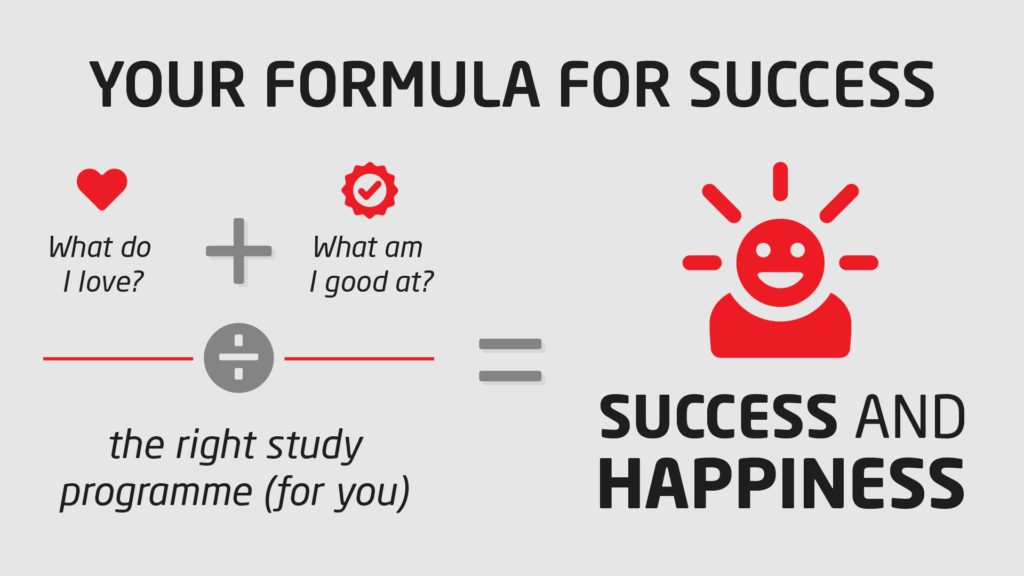What to study at university: the secret to success
There’s a lot of advice out there about how to get a successful study outcome. The trouble is that a lot of it is based on individual experience.
For many people, it can be hard to decide what university programme to choose from, and which route is the right one to take.
By interviewing hundreds of international students over the years though, we’ve noticed a recurring pattern that is so simple, it’s hard to believe it works.

For nearly every success story we hear, this common formula comes up:
What do I love? X what am I good at? / the right study programme (for you) = success and happiness
Sounds simple, right? It is, but before you put it to the test, you need to be completely clear about each element to really know what to study at university. Here’s how:
How can I be sure about what I love?

Figure out what you really love!
What you think you love, and what you really love can be two different things. Often, we think we love what we’re good at (more on that later) – if that is the case, brilliant! You’re one of the lucky ones.
The way to know what you really love is to imagine what you think you love. Then, notice how it makes you feel. Think about some subject areas and potential occupations.
Do you get a pang of excitement in your chest? Have you automatically got a smile? Is that a warm feeling in your belly? These things are all good signs – you’re probably on the right track.
If that doesn’t happen, or you’re not really sure what your true passion is, it’s time to take another route.
What do you enjoy doing in your spare time? What activity makes you spring out of bed in the morning if you know you’re doing it that day? Which pursuits do you do that make time disappear?

Whats your hobby? Photography? Sports? Cooking?
It may not be something really obvious – and don’t worry if it isn’t. There are so many careers out there now that require unique, non-traditional skills and of course there are university programmes that will lead you there.
How do I know what I’m good at?
This one is easy: ask! Your friends, your teachers, your boss or your study partners – most people will be able and happy to pinpoint your main strengths when you ask them directly.
Get a few different opinions, and you’ll probably notice a pattern. If you do, there’s your answer.
Also, don’t forget your own insight with this one. Write a list of things that you find easy – they don’t just have to be related to studying or your future career.

Write a list of all the things you like and are good at.
Perhaps you’re great at organising events, good at talking to new people, an excellent listener, the person who can always fix broken things…
Think outside the box – it’s not about becoming a success at the things you’re already good at, it’s about using the things you’re good at to help you become a success in the thing you love.
What’s the right study programme for me?

Ask yourself these questions…
To uncover the answer to this one, first you need a checklist (we’ve offered some suggestions below), and then it’s time to research the subjects, programmes and universities that fit the bill. Here are some questions to help you shape your research:
- Which subject area(s) am I interested in?
- What sort of surroundings do I thrive in? For example, a beach, city or countryside location?
- What sort of teaching and learning style suit me best: research intensive? Academic? Traditional? Modern?
- What type of subject area do I want to study: Scientific? Humanities? Mathematical? Creative?
- How do my shortlisted institutions rank in that subject area?
- How important is the overall university ranking within my chosen industry?
Overall rankings can be important, but don’t forget that it’s those other factors mentioned above that will matter when it comes to thriving in your studies and being successful overall. And remember this: employers are mostly interested in you – your grades, your interpersonal skills, and your overall suitability for a job.
Don’t rule out a course or university just because it isn’t ranked in the top 20. It might do other things well which turn out to be exactly what you need to succeed in your degree – and you’ll enjoy the experience along the way.

Eureka! You’ve found the secret to study success.
You may also like to read 7 things all successful people do or Fhendra’s 5 tips on getting a first class degree.
To find out which of INTO’s network of university partners could be right for you, click here.
Do you want to connect with other students studying abroad? Follow us on Facebook, Twitter and Instagram. Subscribe to our YouTube to find out more about the study abroad experience from INTO students.



